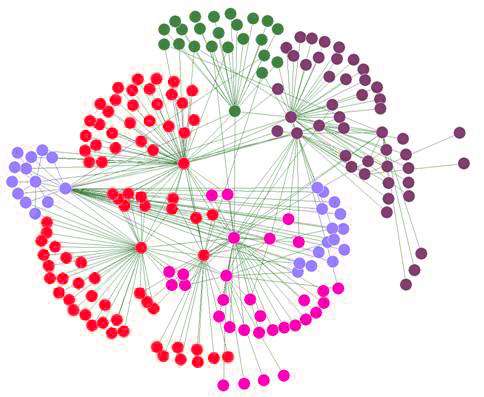This article has been reviewed according to Science X's editorial process and policies. Editors have highlighted the following attributes while ensuring the content's credibility:
fact-checked
peer-reviewed publication
trusted source
proofread
Stronger social networks key to addressing mental health in young adults, research finds

Having strong social networks, or a set of individuals a person is connected to, can make people more resilient to symptoms of anxiety and depression, particularly among young adults whose social lives and relationships were disrupted by COVID-19.
A team of Indiana University researchers led by Brea Perry, the Allen D. and Polly S. Grimshaw Professor of Sociology in the College of Arts and Sciences at IU Bloomington and associate director of the Irsay Institute, measured levels of depression and anxiety among four age demographics: 18 to 25, 26 to 44, 45 to 64, and 65 and older.
Despite all age groups experiencing pandemic-related disruption, the study showed that 18- to 25-year-olds disproportionately experienced increases in anxiety and depression.
Though COVID-19 has been studied extensively, there is relatively little high-quality research on how the pandemic affected the mental health of different age groups. Perry's study compares people across age groups in the Midwest who were given the same survey questions, providing a clearer picture of the composition of their social networks and why connectedness matters.
"Our mental health system is under extreme pressure right now from the demand of adolescents and young adults for services," said Perry, who is also associate vice president and vice provost for research at IU Bloomington. "We need to identify what can be done at the societal level to help people feel more integrated and help them develop stronger social relationships."
Increased levels of anxiety and depression in young adults could be attributed to facing COVID-19 social restrictions while being at a life stage where they are becoming more independent from their families and experiencing major life transitions. Of those surveyed, these symptoms peaked in 2021.
While they have since improved, they have not returned to pre-pandemic levels, suggesting that the pandemic could have lasting consequences for youth and young adult mental health.
Consistent with what has been called an "epidemic of loneliness and isolation" by the U.S. surgeon general, the lack of strong social networks can have long-term effects on young adults.
"There's this growing sense of anomie or purposelessness associated with feeling disconnected from social institutions, groups, and norms—a feeling of 'well, anything goes' that fosters precarity and uncertainty—that I think is more prevalent now than past generations," Perry said.
"Having the anchor of a strong, closely knit social network is really important for giving young people a social psychological sense of security that's protective of their mental health."
Among the young adults surveyed, researchers found that those who had more intimate and interconnected social networks did not experience the same increases in depression and anxiety as those with weaker networks, indicating that strong, positive relationships provide a protective buffer against feelings of stress and loneliness.
The study is published in the American Journal of Public Health. Other authors include former IU doctoral students Nicholas Smith and Max Coleman and Distinguished Professor of Sociology and founding director of the Irsay Institute, Bernice Pescosolido.
What's promising is that young adults can take steps to build a stronger community, Perry said. Social networks among young adults are naturally expansive, spanning connections from school, work, and other interests. One way that 18- to 25-year-olds can build more connected networks is by meaningfully engaging in groups, like volunteering or joining social justice movements. These activities give a sense of purpose, build community, and foster social ties.
Schools, universities, and workplaces can also implement practices that prioritize social connectedness, like substituting virtual meetings with walking or in-person meetings or hosting social events where colleagues can connect on a personal level.
More information: Brea L. Perry et al, Social Networks, the COVID-19 Pandemic, and Mental Health: Resiliency Through Social Bonding and Cohesion, American Journal of Public Health (2023). DOI: 10.2105/AJPH.2023.307426



















